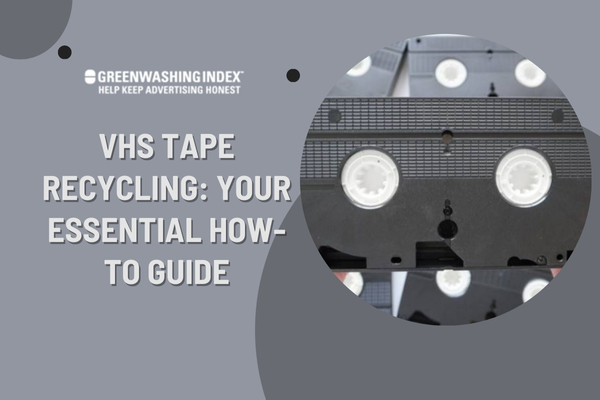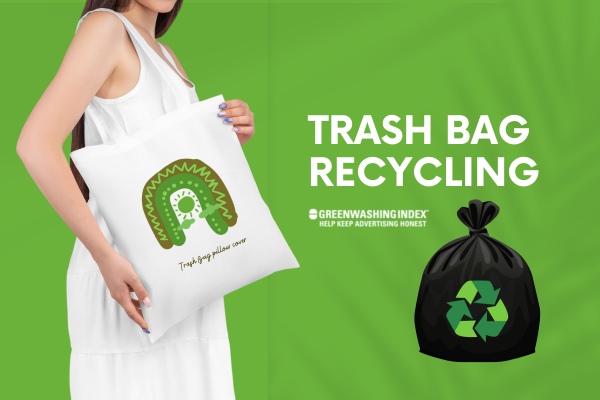Old VHS tapes may seem like relics of a bygone era, but they pose a unique challenge when it comes to disposal. As these bulky cassettes gather dust in our homes, many are left wondering about the best way to handle them.
Properly disposing of VHS tapes is not just about clearing space; it’s also an opportunity to contribute to environmental sustainability. By recycling these tapes, you can help reduce landfill waste and prevent harmful materials from polluting our planet. Let’s explore the eco-friendly methods available for disposing of your outdated media collection.
VHS Tape Recycling
VHS tapes, once a popular medium for home videos and movies, are now largely obsolete due to the advent of digital technology. However, many people still have old VHS tapes lying around, leading to questions about how to dispose of them responsibly.
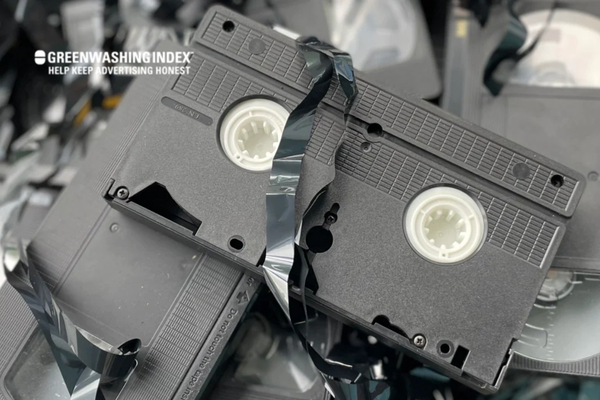
Videotape recycling is essential not only for decluttering but also for environmental reasons, as improper disposal can harm the ecosystem. Here’s a comprehensive guide on how to recycle VHS tapes effectively.
Eco-Friendly Disposal Options
Recycling Centers: The most straightforward method for VHS tape recycling is to take them to a local recycling center. Many centers accept VHS tapes, although policies may vary by location. It’s advisable to contact your local facility beforehand to confirm their acceptance and any potential fees involved.
DIY Recycling Methods: For those who prefer a hands-on approach, DIY recycling involves separating the components of the VHS tapes. This includes removing the plastic casing, magnetic tape, and any metal parts. Each component must be recycled appropriately: the plastic can often be recycled, while the magnetic tape may require special handling due to its toxic materials.
Specialized Recycling Programs: Several organizations offer specialized services for videotape recycling. For example, companies like TerraCycle provide boxes for consumers to fill with old tapes; once full, they collect and recycle them for a fee. Other options include charities that accept commercial tapes for resale or organizations that focus on eco-friendly disposal methods.
What are VHS Tapes Made from?
VHS tapes are intricate devices that consist of various materials and components designed for video recording and playback. What they are made from can provide insight into their functionality and the challenges associated with recycling them.
Composition of VHS Tapes
- Outer Shell: The casing of a VHS tape is primarily made from polypropylene, a type of #5 plastic. This durable plastic protects the internal components and provides structural integrity to the cassette.
- Recording Medium: Inside the cassette, the actual videotape is approximately 800 feet long and ½ inch wide. It is composed of a Mylar base coated with magnetic materials, typically iron oxide or chromium dioxide. These coatings allow the tape to record audio and video signals effectively.
- Spools and Mechanisms: VHS tapes contain two spools that hold the tape, along with several low-friction rollers to guide it during playback. Additionally, there are spring-loaded locks to prevent the tape from unrolling inside the cassette.
- Coatings and Additives: The magnetic coating on the tape is crucial for its recording capabilities, as it determines the tape’s magnetic properties, including frequency response and signal-to-noise ratio. The back side of the tape is often treated with carbon to reduce static electricity.
VHS tapes are made from a combination of plastics and specialized magnetic materials that work together to create a reliable medium for video recording. This complexity also presents challenges for recycling efforts, as many components require specific processing methods to be disposed of properly.
The Importance of Recycling Old Media
So why fuss over old tech like VHS tapes? For starters:
- Protect Our Planet: These tapes could sit in landfills forever – hundreds of years even! We need to keep ’em out to save our Earth.
- Resourceful Thinking: We have limited resources on this planet, folks! We gotta make sure we use what we have smartly by reusing or repurposing when possible.
- Keep Toxins Away: Last but not least – if we don’t dispose of VHS tapes right, they can leak nasty chemicals into soil and water, which hurts wildlife – no good!
By focusing on eco-friendly ways like VHS tape recycling, we’re tackling big problems one small step at a time:
- Reducing waste pile-up in landfills
- Saving raw materials
- Protecting nature from harmful substances
Recycling old media might feel like finding a needle in a haystack sometimes – but hey, every little effort counts toward making our planet healthier!
The Challenge of VHS Tape Recycling
When I think about recycling VHS tapes, it’s not like tossing a soda can into the blue bin. It’s way tougher. See, there aren’t many places that take these old tapes for recycling. The reason is simple: they’re made of stuff that’s not easy to break down and reuse.
The inside tape – you know, the part that actually has the movie or video on it – is coated with metals. That makes it hard to recycle because separating the metal from the tape takes a lot of work and special machines most places don’t have.
Then there’s the plastic case around the tape. It might look like any other plastic, but it’s not always welcome in your regular recycling bin because some recycling centers can’t handle this kind of plastic.
To top it all off, these tapes have bits like screws and springs inside them too. So even if you could recycle some parts, others would get tossed out as trash anyway.
In short, VHS tape recycling isn’t as straightforward as other items because:
- They’re made with tricky materials.
- Few places offer VHS recycling services.
- Taking them apart is a hassle.
Also Read: Paint Recycling: The Ultimate Guide to Responsible Disposal
Step-by-Step Guide for VHS Tape Recycling
When it comes to old VHS tapes, many of us might just toss them in the bin without a second thought. But did you know that there’s a proper way to deal with them that won’t harm the planet? I’m going to talk you through the right steps to take care of your outdated collection.
Step 1: Assessing Your Collection
When I start looking at my pile of old tapes, the first thing I do is sort them out. This helps me see what I have and what could be kept rather than just throwing everything away.
Here’s how I sort through my collection:
- Check for classics: Some VHS tapes might be collector’s items or rare finds. Those are worth keeping.
- Home movies: If there are home videos, it’s a good idea to hold onto these or convert them to digital files.
- Condition matters: Look over each tape. If it’s broken or really messed up, it’s probably not going to be much use.
- Duplicates: If I find more than one of the same movie, one copy might be enough.
This step is all about making sure that nothing useful or special gets tossed out by mistake.
Step 2: Reusing Options Before Recycling
Before I even think about recycling, there might be ways to reuse those tapes. Here are some creative alternatives:
- DIY crafts: These old tapes can turn into cool picture frames, wallets, or even bags if you’re crafty!
- Donate for art: Art schools or creative types might want these for projects.
- Education centers: Sometimes, places like libraries or daycare centers can be used for educational purposes.
Thinking outside the box means giving those old cassettes a new lease on life and keeping them out of landfills.
Step 3: Finding Specialized Recyclers
Now, if it’s time to recycle, you want to find the right place that knows how to handle this outdated media:
- Check online: Lots of times, you can find a recycler by searching “VHS tape recycling” on your computer.
- Local programs: Some towns might have e-waste days where they take stuff like this.
- Ask around: You could talk to your local library or electronics store – they sometimes know where these can go.
Remember – regular recycling bins won’t work here; you’ve got to look for those special spots that handle VHS cassette recycling options.
Also Read: Glass Recycling Uncovered: Endless Lifespan Explained!
Handling Cassette Tapes Alongside VHS Tape
As I tackle the puzzle of VHS tape recycling, I know many folks struggle with a similar issue—what to do with those old cassette tapes. Both VHS and cassettes share a common thread: they come from an age when movies and music lived on tape.
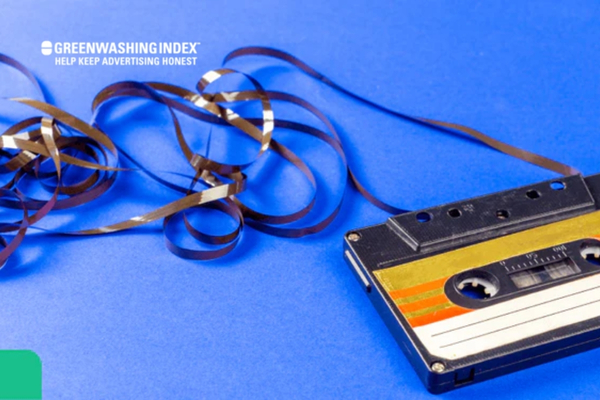
They sit in our homes, a reminder of days gone by, but now we’re faced with throwing them out, and it feels wrong. So, let’s have a look at how we can care for cassette tapes as part of our journey in eco-friendly tape recycling.
Coordinating Cassette With VHS Tape Recycling Efforts
First things first, it’s good to know that both VHS tapes and audio cassettes are made from plastic. This means they can’t just be tossed in your regular recycle bin; they need special care. I always tell friends thinking about environmental tape disposal that these tapes are buddies in the world of recycling—they go hand in hand.
When you start gathering your old tapes for VHS tape recycling, set aside a spot for cassette tapes, too. Keeping them together simplifies things because often, places that accept one will take the other too. Even though these two types of media are different shapes and sizes, they’re quite similar under the skin—both have magnetic tape inside, which stores the sounds or sights that entertained us back in the day.
The real trick—and please pin this—is finding locations where you can drop off these relics for sustainable disposal methods. Not every place knows how to handle them properly because modern recyclers mainly focus on stuff like paper and plastic bottles.
Here’s what I suggest:
- Investigate Local Options: Start by checking if your city or town has any specific options for cassette tape disposal.
- Gear Up Online: Look up companies online who specialize in this field—some will even send you packaging to ship your old media directly to their site for proper processing.
- Think Out-of-the-Box: Occasionally, local schools or art programs love taking these materials for craft projects—it’s worth asking around.
- Join Forces: If you’ve got friends pondering how to get rid of their own collections, consider pooling together—a larger batch might open up more doors or make shipping costs more bearable if you go with an online recycler.
A good rule of thumb is this: don’t rush into tossing these items away without considering their impact on our planet; put effort into finding a suitable channel that ensures your VHS cassette recycling options are eco-friendly.
By walking this extra mile, not only do we protect Mother Earth by reducing landfill waste but also sometimes help others by contributing through creative reuse options or donations—showing me music does indeed have power beyond just melodies.
So there we have it—a simple approach to coordinate our cassette crispers alongside those big chunky rectangle kin—the classic VHS! It’s like giving our past favorites one last encore before they exit stage right into green horizons.
Also Read: Old Electronics Disposal: Ultimate Recycling Tips Guide
The Digital Revolution – Converting Your Analog Treasures
We’re living in a time where everything is at our fingertips, thanks to smartphones and the internet. But what about the old memories we have stored on VHS tapes and cassettes? The videos of birthday parties, holidays, and that mixtape from high school—these are all formats that are hard to play today.
That’s where VHS tape recycling comes into play. We’re not just talking about tossing them out; we’re talking about giving these old treasures a new life.
Making Memories Digital – The Transition from Analog
What’s this Digital Transition? It’s all about turning your analog stuff – like VHS tapes or cassette tapes – into digital files. This way, you can keep your memories safe and sound for much longer.
So how do you do it? There are services out there that can help with converting analog data from both cassettes & your primary focus (which for many folks is their old home videos) into digital formats!
First up, find a reliable service. Look for one with good reviews and reasonable prices. There are plenty of options online!
Next, gather all your tapes. That’s right—dig them out from wherever they’re hiding! It might be a bit dusty, but think of the treasure you’ll find.
Then, pack them up carefully so they don’t get damaged on their journey to the conversion service.
Now, here comes the magic part: Transformation! The service will take your tapes and turn them into digital files like MP4s for video or MP3s for audio—which means you can store them on computers, hard drives, or even cloud storage!
The best part? Once they’re digital:
- You won’t worry about those old tapes getting worn out.
- You can watch or listen on any modern device.
- Sharing with family or friends is as easy as sending an email!
Now that’s solved, what happens to those old VHS and cassette tapes?
Well, rather than throwing them away (which isn’t great for our planet), we go for eco-friendly tape recycling. This means finding places that accept these materials so they can handle them responsibly.
Many recycling centers specialize in electronic and media items and are called e-waste recyclers. They will take your now-empty physical tapes off your hands and make sure the parts that can be saved are reused—a win-win situation.
Preparing Tapes for VHS Tape Recycling
Before you start recycling your VHS tapes, you need to prep them correctly. Getting your tapes ready for recycling helps separate the parts that can be recycled from the ones that cannot. I’ll walk you through this process step by step.
How to Safely Dismantle Your Tapes?
If you’re ready to tackle VHS tape recycling, it’s important to prep your tapes the right way. Let me guide you through the steps. But first, remember to be safe! Old tapes can break and might hurt you. Always work in a well-lit area so you can see what you’re doing.
- Find a Clean Workspace: Clear a table or desk where you can work without making a mess.
- Gather Tools: You’ll need scissors and maybe a screwdriver, depending on the tape.
- Cut the Film: Open the cassette’s protective shell by removing screws, if there are any, or gently prying it open with your fingers or a tool like a flat screwdriver for cases glued together. Cut the magnetic tape inside and pull it out.
- Remove Inner Reels: Take out any spools or reels that were holding the tape.
- Separate Materials: Group all the similar materials—plastic parts in one place, metal pieces in another (like screws), and magnetic tape in its own pile.
Remember, some parts are easier to recycle than others. The plastic case might be recyclable with regular plastics—just check your local guidelines.
Clean Up and Package
Once everything is separated, let’s clean it up before sending it off for recycling.
- Clean Plastic Parts: Gently wipe any dust from plastic parts with a damp cloth – don’t get them too wet!
- Dry Everything Well: Make sure all parts are completely dry to prevent mold or mildew that could ruin them for recycling.
- Pack Separately: Put each type of material in its own bag or box—plastic with plastic, metal with metal.
- Label Them Clearly: Write on each bag or box what’s inside—recycling centers will appreciate this step!
And there you have it! Your VHS tapes are now ready for their eco-friendly journey through VHS tape recycling! Remember: do this carefully and take your time so everything is sorted correctly for sustainable disposal methods—it makes environmental tape disposal much more effective!
Also Read: Car Recycling: Your Ultimate Guide & Why It’s Crucial
Drop-off & Mailing Options for VHS Tape Recycling
When we think about recycling, we often picture paper, bottles, and cans. But what about those old VHS tapes gathering dust? Yes, those, too, can be recycled. Let me guide you through the process of dropping off your old VHS tapes or mailing them to centers that specialize in recycling this form of old media.
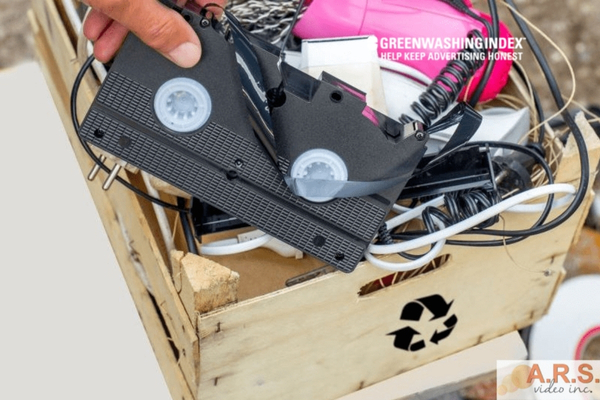
Finding Local Drop-Off Locations
When it’s time to clear out those old VHS tapes, it’s important to find the right spot to take them. I have some helpful steps on how you can locate nearby drop-off points that are set up just for VHS tape recycling. This is an eco-friendly way to get rid of your unwanted tapes.
- Step 1: Online Search: Start with a quick online search. Use your favorite search engine and type in “VHS tape recycling near me”. This should show you some places close by that accept old tapes.
- Step 2: Recycling Directories: Look at online directories that list recycling centers. There are websites dedicated just to helping people recycle different things, including VHS tapes. These sites can be really handy.
- Step 3: Call Ahead: Once you’ve found a few places, give them a call. Make sure they’re currently taking VHS tapes. Sometimes, what’s online isn’t up-to-date.
- Step 4: Special Events: Sometimes, there are special recycling events where you can drop off old electronics and media items. Keep an eye on local news or community boards for any announcements about these events.
Mailing Tips for Remote Recycling Solutions
If there’s no place near you that takes VHS tapes for recycling, sending them through the mail might be a good option. Check out these tips if mailing your tapes feels like the right choice:
- Shipping Service: Choose a reliable shipping service with tracking options so you know where your package is at all times.
- Proper Packaging: Pack your VHS tape tightly in a box so they won’t move around too much during their trip. You don’t want them breaking open.
- Reduce Shipping Weight: Since most of the weight comes from the tape inside the cassette, consider removing it if possible before sending it off for recycling.
Remembering these tips could mean less harm to our planet when we recycle correctly!
From Waste to Wealth – Earning from Old Tapes
Like old clothing that can be donated for a small reward, the same may go for VHS tapes. Indeed, VHS tape recycling isn’t just good for the earth; it might also be good for the wallet. I’ve learned that some folks are willing to pay for these nostalgic items.
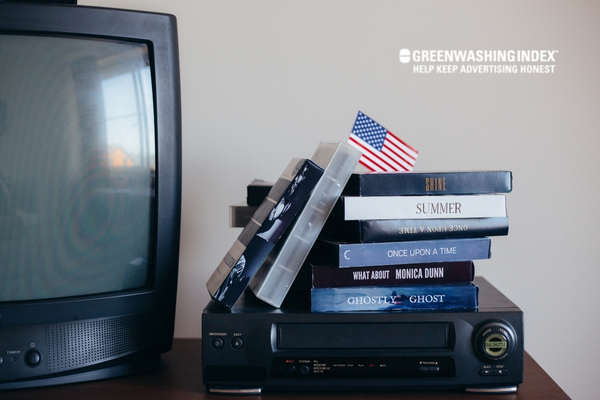
Monetizing Outdated Media
1. Trade-in Programs: Some companies offer trade-in programs where you give them your old tapes in exchange for money or store credits. It’s a win-win – you get rid of clutter and earn something back.
2. Specialty Recycling Services: There are services that focus specifically on VHS cassette recycling options. These specialized recyclers sometimes have monetary incentives if they can reuse or repurpose the materials.
3. Online Selling Platforms: Have you ever heard of online marketplaces? Yes, places where people buy and sell stuff all the time – take eBay, for instance. Here’s a surprise: there’s actually a market for old VHS tapes, especially rare or classic ones! You could earn by listing yours there.
4. Artistic Repurpose: Some artists and crafters love using old tape reels to create new items like bags or furniture pieces! They might pay you to take those off your hands.
Here’s how one might go about this:
- First off, gather all your VHS and cassette tapes.
- Next up, check online to see which trade-in programs might give rewards or cash.
- If no program seems right, turn to an online marketplace – ensure you describe the condition honestly!
- If feeling creative, reach out on social platforms if any artist is interested in using your collection.
In doing this, not only am I partaking in eco-friendly tape recycling, but I am possibly making some money too!
FAQs
What exactly falls under the umbrella of ‘VHS tape recycling’?
VHS tape recycling means taking your old VHS tapes and finding a way to reuse or manage their materials. It helps keep them out of landfills.
Can I recycle my old cassette tapes along with my other electronic waste?
Yes, you can often include cassette tapes with other electronics for disposal. But always check with your local recycling program for specifics.
Conclusion
Recycling old VHS tapes is a necessary step towards reducing landfill waste and protecting the environment. It sounds like a straightforward task, but the unique materials used in these tapes complicate the recycling process. Specialized facilities are required to handle the plastic and magnetic components properly.
By engaging in videotape recycling, individuals can contribute to a more sustainable future, ensuring that harmful substances do not leach into the soil and water. Embracing VHS tape recycling not only declutters our spaces but also promotes responsible environmental stewardship.

